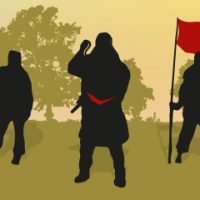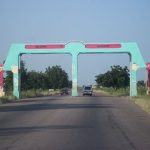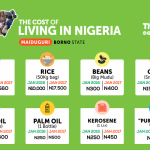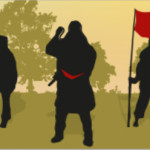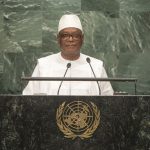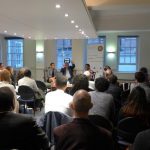By the time Muhammad Yusuf became leader of Boko Haram in 2003 he was already entrenched in the Islamic activism of the region. Born in January 1970 in Jakusko, Yobe state, Yusuf dropped out of school and received Islamic education from his father and other prominent Islamic teachers in Nigeria, Chad and Niger. In the 1990s he was a member of a Shi’a sect, Islamic Movement in Nigeria, under the leadership of Ibrahim El-Zakzakky, but increasingly came to support a stricter interpretation of the Qur’an.
By 2001, Yusuf had moved away from the Shi’a doctrine to align himself with Sheikh Ja’afar Mahmud Adam of Kano in the Izala movement. When Sheikh Ja’afar later broke away from that movement to form the salafi organisation Ahl Al-Sunna, he made Yusuf leader of its youth wing. Yusuf was seen as the likely heir to Sheikh Ja’afar on account of his brilliance, but after meeting Muhammad Ali he became further radicalised, adopting a stricter, Salafist interpretation of Islam that he found a home for within Boko Haram.
In 2009, Yusuf published Hadhihi Aqidatuna wa Minhaju Da’awatuna (“This is our creed and the methodology of our propagation”). The book calls for a return to the pristine age of Islam, in which the Qur’an, sunna and hadiths are the only guiding principles for Muslims. The text rejects democracy, secular constitutions and Western forms of governance, and seeks the gradual establishment of an Islamic state. This worldview was promoted more vehemently and violently by Abubakar Shekau after Yusuf’s death in police custody in July 2009.
A radical turn
Even before 2009 the support within Boko Haram for violent struggle had increased. Mamman Nur, a Cameroonian and close aide of Yusuf, had become more radical and aggressive in his preaching. Rather than confronting democracy and Western civilisation only at the local level, he spoke of the need to challenge the entire history of engagement between the Western and Muslim worlds.
In many ways Nur symbolises the final crossover of Boko Haram from local Salafism to international jihadism. Reports suggest he has links with al-Qaeda. After Yusuf’s death, Nur reportedly fled to Somalia, where he trained with al-Shabaab and Al-Qaeda in the Land of Islamic Maghreb (AQIM) militants. On his return to Nigeria, Nur masterminded the bombing, on 26 August 2011, of the United Nations (UN) offices in Abuja which killed 21 people. Two months earlier, he had coordinated and participated in an attack on the Federal Police Headquarters in the city, the first deployment of suicide bombers in Nigeria’s history.
Khalid al-Barnawi
Although Shekau is Boko Haram’s most prominent leader, it is fair to say that in addition leading the emergence of a new faction, Khalid al-Barnawi has also contributed to its cross-regional connections. After the 20 January 2012 Boko Haram attack in the city of Kano that resulted in the death of at least 180 people, mostly Muslims, Abu Usmatul al-Ansari, released a video proclaiming the creation of Jamaatul Ansaril Muslimina fi Bilad Sudan (ANSARU). Security agents have long suspected that that the name Abu Usmatul al-Ansari is a pseudonym for Khalid al-Barnawi.
Al-Barnawi used to be one of Shekau’s deputies, and is believed to have trained with AQIM in Algeria in the mid 2000s. He is suspected of participating in a series of AQIM-led kidnapping operations in Niger, Kano and Sokoto in 2012; and was one of the three leaders of Boko Haram designated “global terrorists” by the US State Department on 21 June 2012. The other two were Abubakar Adam Kambar and Shekau.
Shekau from the shadowsAlthough verifiable information about Shekau is scarce – his place of birth and age are not conclusively known – it is clear that he has provided ideological re-orientation to accompany Boko Haram’s transformation. After he took charge in 2009, Shekau called for the full and immediate implementation of Sharia law both in Nigeria and globally. He introduced to Nigeria the concept of takfirism, a jihadi-Salafi theological principle that declares non-Muslims and Muslims who have betrayed Islam as infidels deserving death. He considers Muslims who engage in dialogue with Christians as conspirators against Islam. Such rhetoric has become much more prominent under Shekau’s leadership, an exhortation to “kill a security official because he represents the Western state” being just one example.
Many of these views are espoused in the YouTube videos Shekau has released where he seeks – in Arabic, Hausa and Kanuri – to differentiate Boko Haram from the Maitatsine, Shia and Izala groups and other historical Islamist movements in the region. In short, Shekau can be conceptualised as a modern day Nigerian ultra-jihadi-salafist, a puritan who argues for the literal and inflexible interpretation of the Qur’an, insisting on absolute adherence to Sharia law. He belongs to the school of hardline Islamic scholars like Ibn Taymiyya, Ibn Wahhab and Rashid Rida.
Reaching out
However, Yusuf and Shekau both realised that not everyone in north-eastern Nigeria would find discussions about salafi-jihadi ideology relevant to their daily experiences. So they localised this ideology by manipulating the history of Islam, the Kanem-Bornu empire and corruption in Nigeria. The ability to convey this message was undoubtedly aided by their oratory and their fluency in the local languages of the region, Kanuri and Hausa.
In the early 2000s, Yusuf and his inner circle were able to travel freely across the north east of the country on buses with loud-speakers attached to preach their message to communities. The messages resonated and were spread quite simply by debate, discussion and word of mouth. They also owned radio houses where they held debates in vernacular languages and recorded tafsir (sermons) and discussions that were readily available for purchase in local markets.
In short, Boko Haram used many of the same systems that Islamic sects have always used in the region to attract followers; and the You Tube videos provide an insight into the ideology that was disseminated. However the escalating conflict with Nigerian security personnel forced the group to use more coercive tactics. Kidnapping of recruits has become far more common in recent years.
Listening and learning
In one video I translated, Shekau is talking, in Hausa, to a group of young Muslim men, who have gathered to hear him speak about why they should reject global values and globalisation. Shekau is undoubtedly a very eloquent and persuasive speaker, but he is also sensitive to the environment in which he is speaking. At one point a member of audience interjects to ask “should we therefore also reject the structures of globalisation like phones and microphones?” Shekau’s response is revealing. He explains that that these technological creations are not a product of globalisation but of human intellect which is given to you by Allah. He contends that you obtain human intellect by following Islamic scripture, not from Western education.
This line of argument may not be comprehensible to a listener unfamiliar with northeast Nigeria, but for residents who live in this environment it can appear logical. If you consider that school attendance and literacy levels in the region are very low, and that the vast majority of – for example – mechanics or electronic repair shop workers are self-taught, you begin to see how it can resonate. In the video, Shekau goes on to castigate the values and characteristics of globalisation as Western impositions, but encourages those listening to use both the structures and impacts they have created to fight back: “make use of guns and bombs as Allah gave them to you to help restore the ummah”.
Extremism defiant
Extremist preaching continues to prevail in the region. The leaders of Islamic sects such as Aljana Tabbas (“paradise is certain”) may not be as direct as Boko Haram’s in saying “go and kill”, but they do preach that “a Muslim should not shake hands with a Christian”. Such attitudes will only start to change when the Nigerian government attends to the region’s socio-political and economic environment. As it is now, the state is seen as predatory, rather than as the facilitator of development. Its representatives are simply unable or, with some exceptions, unwilling to set about eradicating chronic poverty and improving education.
Fr. Atta Barkindo is the Director for Faith and Public Policy at The Kukah Centre, Nigeria. He is the author of “How Boko Haram exploits history and memory”.







